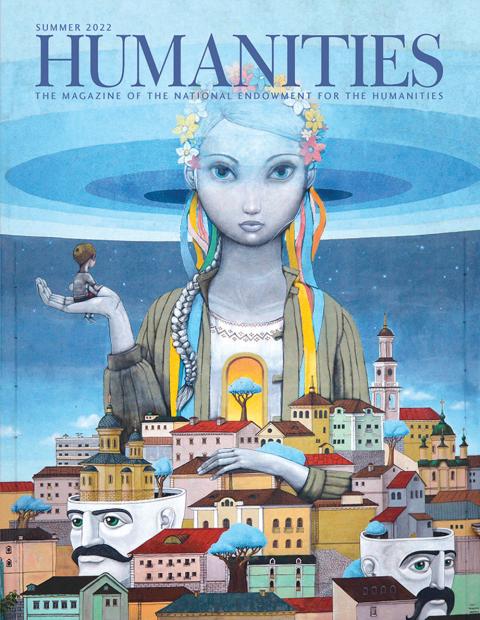As a child, David Pettyjohn scoured the pages of encyclopedias. He still remembers the whiff of ink from the set his parents owned. Those volumes ignited his passion for learning in general and for the humanities in particular. Early on, he understood the value of seeing the world through someone else’s eyes.
“It also helped me realize that I wasn’t alone,” says Pettyjohn. He benefited greatly, he now reflects, from learning from the stories of people experiencing some of the same challenges he faced at the time himself.
He learned about places far from his rural Illinois town, from China to Oklahoma. In fact, he moved to Oklahoma later and happened to notice an ad in a newspaper for a position with the Oklahoma Humanities Council, where he served in three different capacities, including director of programs and assistant director, from 2001 to 2012.
“I got to meet the most amazing people,” Pettyjohn says, “and see what the humanities can do to a community: an opportunity for people to engage with one another respectfully, listen to one another, and see what they’re able to accomplish when they work together.”
“When you travel to a program, . . . you see the successful efforts of an exhibit or [of] bringing in somebody to teach a new idea or a different perspective; that’s what gets me excited.”
On a wall in his office in Boise is a map of Oklahoma decorated with tiny red dots. Each dot represents a place he visited for the council. Near that map is one of Idaho, though this one has considerably fewer dots. “I look forward to adding more and more,” Pettyjohn says. “The pandemic really put a halt on some things.”
Pettyjohn came to the Idaho council in January 2018, and soon thereafter the pandemic stopped him from traveling extensively.
Among the council’s many ongoing projects is Let’s Talk About It, a book discussion program that has been held in partnership with the Idaho Commission for Libraries since 1985, which brings together humanities scholars and adult readers statewide. They’ve discussed books, such as Bury My Heart at Chuck E. Cheese’s by Native American poet and author Tiffany Midge and The Hate U Give by Angie Thomas, that explore American values, history, and culture.
Let’s Talk About It is mainly held in underserved rural communities, where there are sometimes fewer opportunities for adult education. The program aims to help people meet others in the community and learn about societal issues. Pettyjohn himself discovered in his youth the importance of libraries, especially in rural communities.
“As a gay kid growing up in the ’70s and ’80s and even the ’90s, there weren’t a lot of opportunities to see yourself reflected,” Pettyjohn says. “So, the libraries helped me with that,” he remembers, finding novels there with gay characters, such as E. M. Forster’s Maurice, “and then . . . the 1993 film Philadelphia,” which addresses HIV/AIDS and homophobia. “We’re so divided right now in many ways, but the humanities show us our common threads,” Pettyjohn notes.
A lot of the council’s programs are currently being reimagined for a society changed by a pandemic. One program Pettyjohn and the council are reimagining is Inquiring Idaho, which helps organizations involved in lifelong learning connect with speakers of particular interest to them.
Its previous incarnation had more general, loose topics. The council decided in 2021, however, to make the topics more specific to Idahoans’ interests. After surveying a large, diverse group of people in the state, they narrowed down the number of topics to include the Idaho Constitution, pop culture, and environmental humanities.
“Particularly here in Idaho, nature is incredibly important, and how it’s shifting and how it’s evolving,” says Pettyjohn. “Growth is huge here. How does that affect the environment? What are the issues facing us right now?”
He further reflects, “I always viewed the humanities as this vast pool of knowledge. Somebody once explained it to me: It’s like this river that every person who walked before us, or are here, contributes to.”
“Nobody’s excluded,” Pettyjohn adds, “from the humanities. . . . Their very existence is a part of it. And the humanities provide us the tools to help us understand what that experience is from different viewpoints.”
Tell Us More, David
What sets your hear aflame? Opportunity to have an impact. Knowing that the work that I am privileged to do every day could affect the lives of Idahoans in a positive way. What’s something unique in your office? The Underwood typewriter. It was my great grandfather’s. Every time he’d visit, when he left, he would type out a note. I think he had like a third-grade education, but he would just write these lovely messages to us, just type them out and say, “It was so great to see you. I love you.” I brought it here as a kind of reminder of just how much the written word is important.


